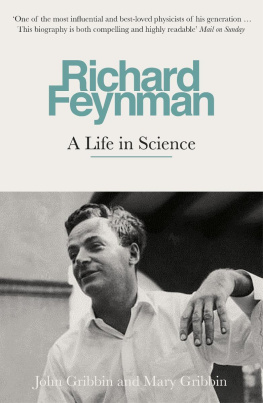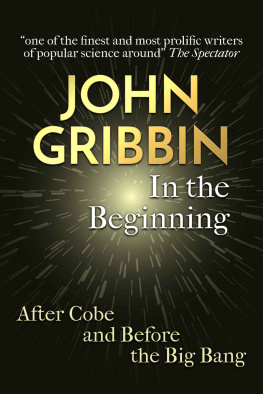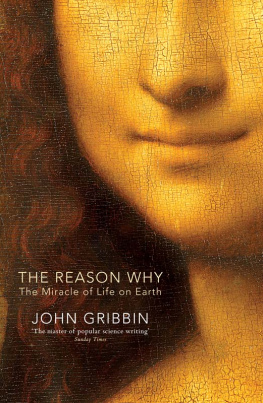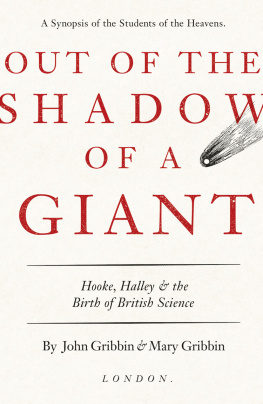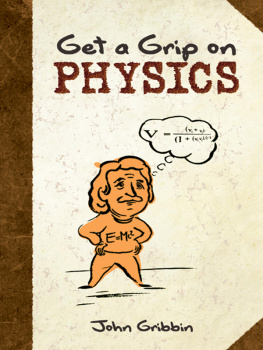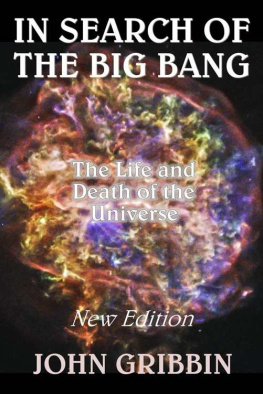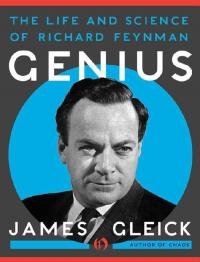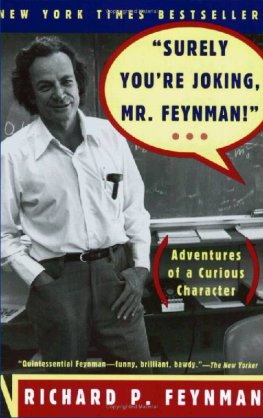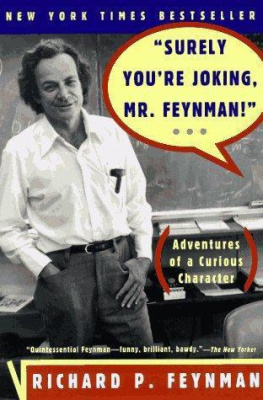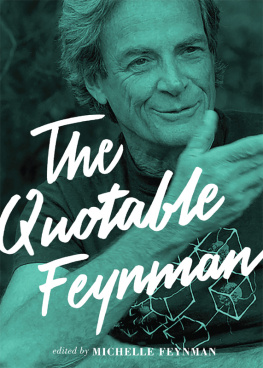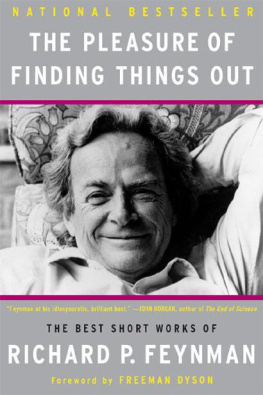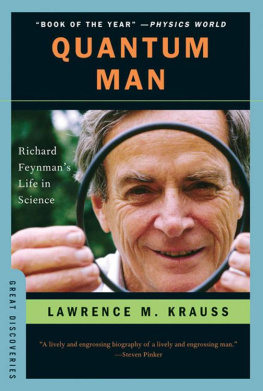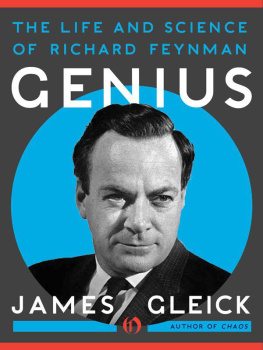John Gribbin - Richard Feynman: A Life in Science
Here you can read online John Gribbin - Richard Feynman: A Life in Science full text of the book (entire story) in english for free. Download pdf and epub, get meaning, cover and reviews about this ebook. year: 1997, publisher: Dutton Adult, genre: Children. Description of the work, (preface) as well as reviews are available. Best literature library LitArk.com created for fans of good reading and offers a wide selection of genres:
Romance novel
Science fiction
Adventure
Detective
Science
History
Home and family
Prose
Art
Politics
Computer
Non-fiction
Religion
Business
Children
Humor
Choose a favorite category and find really read worthwhile books. Enjoy immersion in the world of imagination, feel the emotions of the characters or learn something new for yourself, make an fascinating discovery.
- Book:Richard Feynman: A Life in Science
- Author:
- Publisher:Dutton Adult
- Genre:
- Year:1997
- Rating:3 / 5
- Favourites:Add to favourites
- Your mark:
- 60
- 1
- 2
- 3
- 4
- 5
Richard Feynman: A Life in Science: summary, description and annotation
We offer to read an annotation, description, summary or preface (depends on what the author of the book "Richard Feynman: A Life in Science" wrote himself). If you haven't found the necessary information about the book — write in the comments, we will try to find it.
Richard Feynman: A Life in Science — read online for free the complete book (whole text) full work
Below is the text of the book, divided by pages. System saving the place of the last page read, allows you to conveniently read the book "Richard Feynman: A Life in Science" online for free, without having to search again every time where you left off. Put a bookmark, and you can go to the page where you finished reading at any time.
Font size:
Interval:
Bookmark:
I wonder why. I wonder why.
I wonder why I wonder.
I wonder why I wonder why
I wonder why I wonder!
RICHARD FEYNMAN
Many people gave up time to talk to us about their personal and professional memories of Richard Feynman. Others took the trouble to answer specific queries by mail, e-mail or telephone. Without them, this book could not have been an accurate portrayal of the best-loved scientist of our times. We thank especially Joan Feynman, Carl Feynman, Michelle Feynman and Jacqueline Shaw from Feynmans immediate family circle; James Bjorken, Norman Dombey, David Goodstein, James Hartle, Robert Jastrow, Daniel Kevles, Hagen Kleinert, Igor Novikov, Kip Thorne and Nick Watkins from the world of physics; Feynmans former secretary, Helen Tuck; and Ralph Leighton, who knew Feynman as well as anybody did in the last decade of his life. Even where these people have not been quoted directly, their contributions have helped to shape the image of Richard Feynman in our minds, which we hope comes through in this book.
We have also drawn on published accounts of Feynmans life and work, cited in the text and referred to in full in the Bibliography. Where possible, we have checked important stories about Feynman with their sources; but, of course, we have had to rely on the secondary sources in cases where the originators of the stories are no longer alive, or were otherwise unavailable.
Michael Shermer went to enormous trouble to arrange many interviews for us on a visit to Caltech, and Jagdish Mehra, who was the last person to interview Feynman formally about his life and work, gave permission for us to quote from his own book The Beat of a Different Drum, which remains the definitive technical account of the life and science of Richard Feynman, at a more academic level than the present book.
Benjamin Gribbin spent many hours transcribing recordings of interviews with scrupulous accuracy and unfailing good humour, and Jonathan Gribbin prepared the diagrams with speed and skill. The archivists at Princeton University and Caltech, respectively Ben Primer and Charlotte Erwin, helped us to find source material, as did Karl Berkelman at Cornell University, Helen Samuels at MIT, and Roger Meade at the Los Alamos National Laboratory.
Does the world really need another book about Richard Feynman? We think so, or we wouldnt have written it. And this is why. Richard Feynman was the best-loved scientist of modern times, perhaps of all times, and that is something that simply does not come across in any of the other books about the man and his work. There have been books about Feynman the character, a wise-cracking entertainer who imparted not a little worldly wisdom along with his anecdotes; there have been books about Feynman the scientist, putting his work in the perspective of physics in the second half of the twentieth century; there has even been a picture book, combining the illustrations with reminiscences about Feynman by his family and friends. But nobody has captured the essence of Feynmans science and the essence of Feynmans persona in one book. This is especially odd because, of all the scientists of modern times, Feynman seems to have been the one who had the best feel for science, who understood physics not simply in terms of lines of equations written on a blackboard, but in some deep, inner sense which enabled him to see to the heart of the subject.
This doesnt mean that Feynman lived his life like a scientist, in the stereotypical sense of being a cold-blooded logician in everyday life. Far from it. The point is that he did physics like a human being, carrying into the world of science his inbuilt sense of fun, his irreverence, and his liking of adventure and the unexpected. The way Feynman did his physics depended on the kind of person he was, far more than in the case of any other physicist we know. It is impossible to understand Feynmans science properly without understanding what kind of a person he was, and nobody put more life into science than he did.
Equally, it is impossible to understand what kind of man Feynman was without understanding at least something of the science that was so important to him. A fun-loving, adventurous character like Feynman was attracted to physics because physics is fun, and offers opportunity for adventure. You may find that hard to believe. But whats wrong with the public image of physics is not so much the science itself as the way that the science is taught and portrayed. Perhaps Feynmans greatest achievement was as a teacher, conveying the fun of science, and entertainer, providing an image of science that cut right across the stereotypes. Ralph Leighton describes Feynman as a shaman of physics. Feynman talked of nature as She or Her, and seemed to have a contact with the way the world works that few people have. When he gave lectures, he brought his audience into contact with nature in ways that they could not achieve on their own, allowing them to see nature differently, in a transforming experience, so much so that often when he explained some subtle point in a way that they could understand the audience would break out into spontaneous applause, even laughter. The physicist Freeman Dyson has commented, I never saw him give a lecture that did not make the audience laugh, but the laughter stemmed as much from the pleasure of finding things out as from the jokes that Feynman cracked.
After this experience, people would often have a memory of understanding something, but couldnt always quite reconstruct how it was they had understood Feynman would raise people to a level of understanding that they had never before achieved, but then they couldnt quite remember how he had done it. Even fellow scientists sometimes felt this way about a Feynman lecture Leighton recalls his own father, one of Feynmans colleagues at Caltech, remarking on this almost transcendental experience. People who attended Feynmans lectures say that they seemed like magic, almost literally spellbinding, while people who met him report the same sort of feeling, an awareness of being in the presence of something special, even when they cant quite put their finger on why. They just felt changed by the experience. And people who never met Feynman still write to Leighton to say that they have been inspired by Feynmans example. It may well be that he will be remembered more in this way, as a wise man, rather than for the specific aspects of the science that he was involved with.
This would be appropriate, and perhaps what Feynman himself would have wanted. To Feynman, love was more important than science; but it just happened that, as well as loving people, he loved physics.
And people, including physicists, loved him. In an obituary published in Nature on 14 April 1988 (volume 332, page 588), Hans Bethe, who had been Feynmans boss both at Los Alamos and at Cornell, said more than other scientists, he was loved by his colleagues and his students. The day Feynman died, the students at Caltech hung a banner across the eleven-storey library building on the campus. The message on the banner read: WE LOVE YOU DICK. Around the world, many people who hadnt even met Feynman felt a sense of personal loss when he died. Neither of us ever met him; but the physicist half of the partnership (JG) was exactly the right age to be among the first undergraduates to benefit from Feynmans Lectures on Physics while at university. The clarity of those lectures helped to shape his career, and reinforced his own feeling that science, even at research level, could still be fun. Reading books and papers by Feynman over the years, and seeing him on TV, reinforced that belief, and made Feynman seem like an old friend.
But to many people who felt the same way, Feynman was, more than any other great scientist of modern times, famous for being famous. The name of Stephen Hawking is inextricably linked with black holes; Albert Einsteins with relativity theory; Charles Darwins with evolution. But Feynman? To many non-scientists, he was just a scientist. This is ironic, because Feynmans greatest work was actually in the area of quantum theory, a subject of enormous fascination to non-scientists today. We want to explain why this work was so important, and how it lies at the heart of investigations of the quantum mysteries today; but we also want to share with you our understanding of the kind of man who carried out that work.
Font size:
Interval:
Bookmark:
Similar books «Richard Feynman: A Life in Science»
Look at similar books to Richard Feynman: A Life in Science. We have selected literature similar in name and meaning in the hope of providing readers with more options to find new, interesting, not yet read works.
Discussion, reviews of the book Richard Feynman: A Life in Science and just readers' own opinions. Leave your comments, write what you think about the work, its meaning or the main characters. Specify what exactly you liked and what you didn't like, and why you think so.

